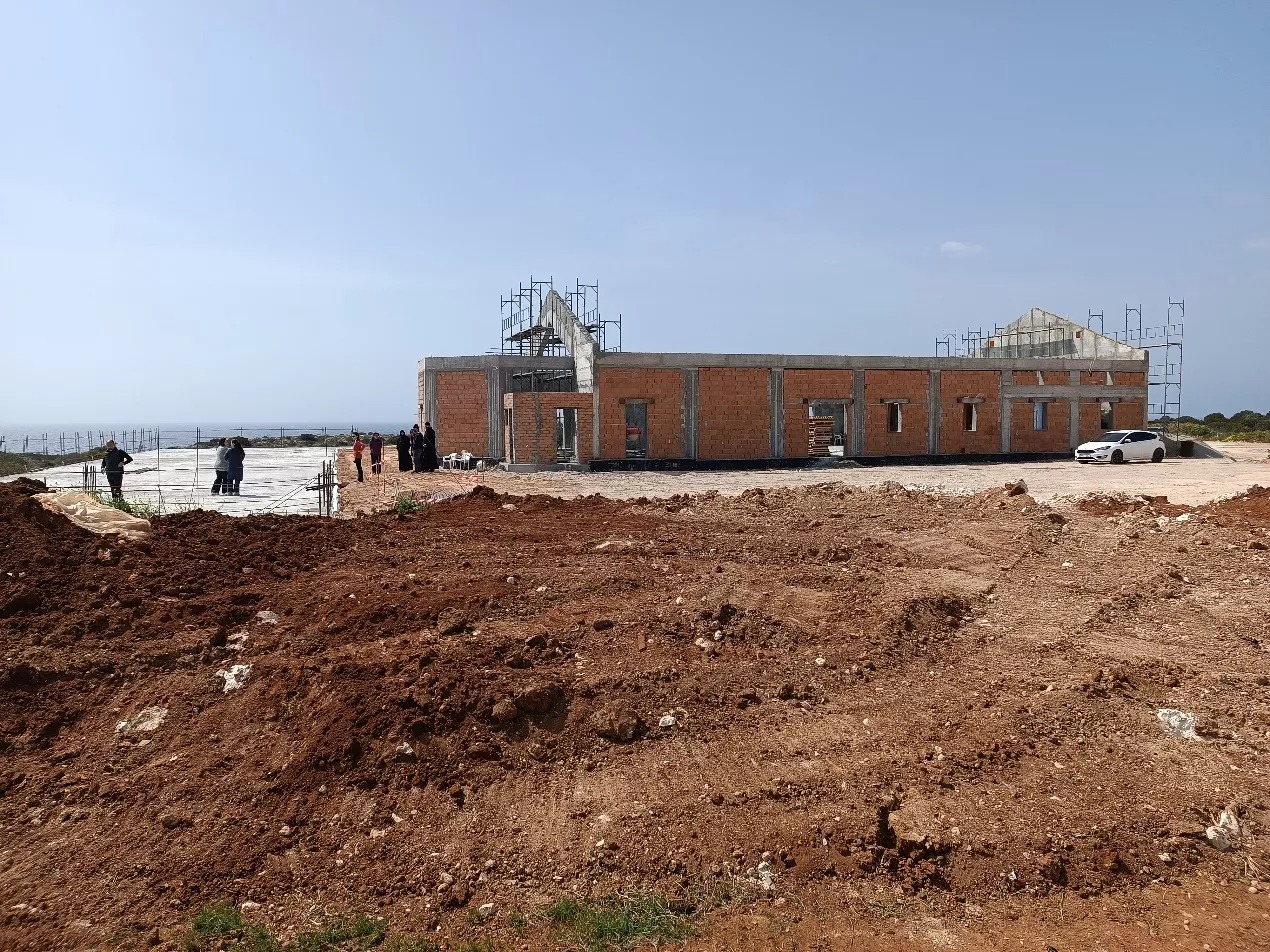The Bishopric of Constantia and Ammochostos has started illegally constructing a monastery within the protected area of Cape Greco, at the same time receiving a negative response to a preliminary inquiry about the possibility of submitting a planning permission application for deviation in the same protected area, in the same planning zone, and for the same designated land use.
In both cases, the pieces of church land are enclosed within state forest land, inside the National Forest Park of Cape Greco.
After initiating the illegal construction of a monastery on another piece of land, when the illegality was discovered by the competent Authorities, the Bishopric of Constantia and Ammochostos notified its intention to submit an application to the Ammochostos District Office of the Department of Town Planning and Housing for the issuance of planning and building permits, by deviating from the provisions of the Ayia Napa Policy Statement.
The said application was eventually submitted, three days after the complaint was filed, on 20/3/2024, accompanied by an environmental study and concerns a piece of land at the location “Mazeri tou Koukou”, in the central part of the protected area of Cape Greco.
The application with number AMX/112/2024 was submitted for the monastery of Saint Efraim and Saint Ekaterini.
It should be noted that on 13/2/2024, an application for preliminary opinions was submitted to the Ammochostos District Office of the Department of Town Planning and Housing by the Holy Metropolis of Constantia and Ammochostos (AMX/P6/2024) for another piece of land at the location “Mazeri tou Koukou”, at the southeastern tip of the protected area of Cape Greco. In the context of this application, the District Officer of Ammochostos from the Department of Town Planning and Housing sent negative preliminary opinions to the Holy Metropolis of Constantia and Ammochostos.
Specifically, the piece of land for which the inquiry was submitted for securing preliminary opinions is located in the Ayia Napa Municipality area, where the provisions of the Ayia Napa Policy Statement (2017) apply.
According to Plans 2 (Land Use) and 3 (Planning Zones) of the Ayia Napa Policy Statement, the piece of land is located in a designated Coast and Nature Protection Area and falls within Protection Zone Da1, respectively. Furthermore, it is included in the protected areas of the Natura 2000 Network, Special Conservation Area, and Special Protection Zone of Cape Greco, while also being enclosed within state forest land and the National Forest Park of Cape Greco.
According to the provisions of paragraphs 10.4.2 and 10.4.3 (Coasts and Nature Protection Areas) of Chapter 10 (Environment and Special Directions for Environmental Integration of Constructions) of the Ayia Napa Policy Statement, Coasts and Nature Protection Areas require absolute protection and no development will be allowed.
Even traditional activities in the agriculture and forestry sectors are not permitted to affect the balance of local ecosystems or the morphology and physiognomy of the area.
In the response dated 28/2/2024 addressed to the Constantia bishop Vasileios, the Ammochostos District Office of the Department of Town Planning and Housing stated that in case of submitting an application for obtaining a planning permit for construction/development on the piece of land, the Planning Authority will not treat it positively.
Subsequently, on 13/3/2024, a notice was published in a daily newspaper about the intention to submit an application for a planning permit by deviating from the provisions of the Ayia Napa Policy Statement for the construction of the monastery of Saint Efraim and Saint Ekaterini, on a piece of land at the location “Mazeri tou Koukou”, in the central part of the protected area of Cape Greco.
On 17/3/2024, a complaint was filed with the Minister of Agriculture, Rural Development and Environment about the arbitrary earthworks and illegal construction of building facilities, aiming at the construction of a monastery, on a piece of land at the location “Mazeri tou Koukou”, in the central part of the protected area of Cape Greco.
The complaint, among other things, notes that the illegal conduct of construction works constitutes an act of contempt and depreciation of the fundamental principles of legality, the rule of law, and good governance. Therefore, the Ministry of Agriculture is called upon to ensure the correct, sufficient, and timely implementation of the current environmental legislation.
On 20/3/2024, an application for a planning permit was submitted by deviation, with reference number AMX/112/2024, for the construction of the monastery of Saint Efraim and Saint Ekaterini on a plot at the location “Mazeri tou Koukou”, in the central part of the protected area of Cape Greco.
On the same date, 20/3/2024, a related announcement was posted at the Municipality of Ayia Napa and in the area where the monastery is illegally being constructed, concerning the intention to submit an application for a planning permit by deviating from the provisions of the Ayia Napa Policy Statement.
Additionally, on 20/3/2024, the bishop of Constantia and Ammochostos sent a letter to the president of the Council for Deviation Studies, enclosing the construction plans accompanying the application for a planning permit by deviation from the provisions of the Ayia Napa Policy Statement.
Essentially, bishop Vasileios states that he wishes to relocate the monastery from its current location in the tourist area to a quiet place near Ayia Napa, where the nuns can live and perform their religious duties.
On 27/3/2024, the District Office of Ammochostos of the Department of Town Planning and Housing issued a notice of enforcement for the immediate termination of illegal works.
It is noted that, according to a decision of the Administrative Court of Cyprus dated 4/12/2019, in case number 1402/2015, “Holy Monastery of Kykkos vs. Republic of Cyprus”, the following is mentioned in a similar judicial case:
“The applicant is not justified in raising claims about the illegal act in which it participated and with its behavior accepted as incorporated in town planning law and subsequently, contradictorily, sought deviation from it, as such a stance fulfills the content of parallel approval and disapproval, which is not acceptable in administrative law.”






